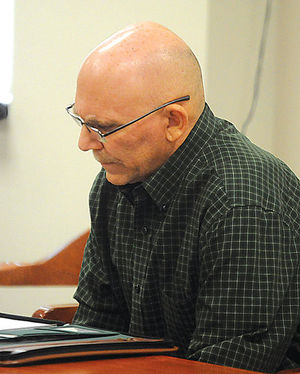Physical Examination, Priest-penitent Privilege Discussed in Pretrial Hearing of Sexual Abuse Case
By Samantha Perry
A physical examination of an alleged victim and the question of whether a pastor violated the priest-penitent privilege were issues brought before the court Wednesday in a pretrial hearing of a former church volunteer accused of sexually abusing boys. Timothy Probert, 57, of Mercer County, is facing 50 charges related to alleged sexual abuse of children stemming from his time spent as a volunteer at Westminster Presbyterian Church in Bluefield and for the Working to Eliminate Child Abuse and Neglect (WE CAN) program. Retired Fayette County Judge Charles Vickers heard the motions in Mercer County Circuit Court. Mercer County judges Omar Aboulhosn, Derek Swope and William “Bill” Saddler recused themselves from the case earlier this year citing conflicts of interest. Addressing the court, defense attorney William Flanigan said one alleged victim spoke of bleeding after anal and rectal sex with Probert. The victim said he had to “use tampons to control the bleeding.” Flanigan said there were no medical records to substantiate the fact, and requested an examination by a court-appointed medical specialist “to look for scarring.” Flanigan called the examination “a big roll of the dice for us.” Assistant Prosecuting Attorney Kelli Harshbarger objected to the motion, saying the victim was abused one time more than 20 years ago and had “healed from it.” “He was humiliated,” Harshbarger said. “He had to steal tampons from his mother to stop the bleeds.” Judge Vickers questioned the language — “torn rectum and anus” — used in the indictment, asking who used that specific wording. Harshbarger said the wording came from the prosecuting attorney’s office. The victim, in his language, stated, “He (Probert) ripped him” as a result of anal rape, she said. Flanigan said there was reason to believe there would still be scar tissue evident. Vickers said he would take the matter under advisement. The defense also argued that Westminster Presbyterian Pastor Jonathan Rockness violated the priest-penitent privilege when he told West Virginia State Police Sgt. M.D. Clemons about disclosures involving Probert’s actions with young boys. Rockness was called to testify, and was questioned by Flanigan about the church’s disciplinary practices, and information from a church investigation turned over to Clemons. An initial report to Clemons involved Probert and an 18-year-old male, however Rockness said “grooming” of the victim took place prior to the teenager turning 18. Rockness testified that when he originally came upon this information he felt it was a “gray area” in terms of mandatory reporting. “I googled ‘sexual abuse reporting,” Rockness said. “I came across a number — a hotline. I called them and said the actual (sexual) acts occurred after the individual was of age (of consent), but by every indication there was grooming going on for several years. That person confirmed this does not qualify for mandatory reporting, however he said if you suspect criminal activity as a citizen you could report it.” Rockness said he contacted the State Police about the incident, but was told at that time there was not enough evidence to pursue a criminal investigation. “Our suspicion, our concern, was that this may be more widespread,” Rockness said, noting he emailed Clemons that “we will have to try to dig into this ourself.” Flanigan questioned Rockness extensively about the church’s “Book of Order” and “Book of Discipline,” governing documents of the Presbyterian Church, and meetings Rockness and two other church elders had with Probert. “Did you have a goal or agenda of generating other information that may allow the state to act upon” Probert’s actions, Flanigan asked. “Our approach was that the state had spoken ...,” Rockness answered. “So it was an in-house matter ... there was some thought in the back of my mind ... that we may uncover something that may need to go back to the state.” Rockness testified that after an initial meeting with Probert, they went to victims and other individuals to corroborate what he told them. He said they learned Probert did not tell them the full story. “The things he admitted to ... he admitted to far less than what he had done,” Rockness said, testifying that at the time he thought Probert was hoping to “wiggle out of it.” Harshbarger questioned Rockness about receiving information from other parties, and asked, “He was confronted? You confronted him?” “Yes,” Rockness responded. Harshbarger also asked if Probert knew what he revealed would be outside of purview of the church. “Correct,” Rockness answered. ‘He would have known you would be talking to other people ... that what he is saying is not being kept within four walls ...?” Harshbarger asked. “That would have been the logical deduction to make,” Rockness responded. “It was clear through all conversations it involved third, fourth, fifth and sixth parties in this.” Assistant Prosecuting Attorney George Sitler asked Rockness about the different in confessions at a catholic church and presbyterian church. “It’s quite different ... the priest-penitent privilege,” Rockness said. “The catholic, orthodox and episcopalian (churches) do have structured rituals using a pastor or priest as an intermediate to God. In presbyterian and other protestant churches we don’t teach people to use an intermediate, but to go straight to the Lord to practice confession.” Sitler also questioned Rockness about any confidentiality with regard to what Probert disclosed to him. “He did not come to me to confess,” Rockness testified. “We went to him to investigate. I was not acting as a pastor but an overseer of the safety of the church. It was not a matter of someone coming to me with a penitent heart to confess.” Vickers will rule on the motions following another pre-trial hearing in January.
|
.
Any original material on these pages is copyright © BishopAccountability.org 2004. Reproduce freely with attribution.
